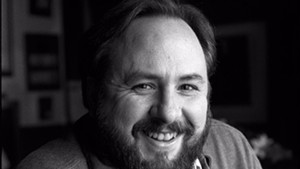
- Joseph Deuel
- Tony Markellis
Tony Markellis, one of our community’s most talented, respected and beloved musicians, passed away in his sleep on April 29, at the all-too-early age of 68. Tony’s talent on the bass was eclipsed only by his heart, wry wit, soulfulness and generosity of spirit, which deeply touched everyone who was lucky enough to have him as a part of their lives.
In addition to being a mainstay on the Burlington music scene for more than 45 years, Tony was omnipresent and equally beloved in his adopted hometown of Saratoga Springs, N.Y. For the past 18 years, Tony also gained national prominence playing bass in Phish front man Trey Anastasio’s eponymous sideline band.
Tony was born on September 10, 1952, in Helena, Mont., the first child of Dr. Victoria C. and Constantine A. Markellis. His mother was a physician and his father a civil engineer who designed and built bridges. Tony’s younger brother, Greg, describes their parents as bighearted folks who believed everybody had value and who promoted childhood independence. Tony adored his mom and dad and made no secret of it. Tony’s family moved to Ann Arbor, Mich., in 1963, while both of his parents completed their master’s degrees in public health, and then to western New York, outside of Buffalo, the year after.
Tony started playing the upright bass in the third grade and, with a full beard at the tender age of 15, he had no problem securing gigs with bands in bars throughout his high school years. In 1968, when the family was on vacation in New York City, his parents allowed Tony, just shy of 16, to take his 11-year-old brother to Singer Stadium in Queens, on the grounds of the ’64/’65 World’s Fair, to see Jimi Hendrix, Janis Joplin and Big Brother & the Holding Company, and the Chambers Brothers. Thanks to a generous cop who hawked them some already used ticket stubs through a fence, the pair managed to witness Hendrix split his tight white pants from front to back. Somehow Tony got close enough to the stage to end up with the strings off Hendrix’s busted guitar.
After graduating from Warsaw Central High School in 1969, Tony enrolled at the University of Michigan a month before he turned 17. He majored in anthropology and art. While going to college and living in Ann Arbor, Tony connected and played with a number of then relatively unknown singer-songwriters, including John Prine, Steve Goodman and a blueswoman named Bonnie Raitt. For a time, he worked as a roadie for the Grateful Dead. He was still a few courses short of the credits required for graduation in 1972 when Bonnie suggested Tony head to the East Coast. He started performing with the David Bromberg Band the following year.
It was Tony’s work with a wide range of singer-songwriters who were recording albums at Philo Records’ Earth Audio Studio, located in a converted dairy barn in Ferrisburgh, that started bringing him to Vermont with increasing frequency. His brother recalls that, on occasion, Tony was called into service to play an instrument other than bass, but he insisted those forays not be credited to him, modestly believing his playing wasn’t worthy enough to note. Look instead for Al Bondigas instrumental credits on some Philo albums from the ’70s. (If Al Bondigas were the clue on “Jeopardy!”, one of Tony’s favorite shows, the answer would be, “What is the Spanish word for ‘meatballs’?”)
It was at Philo’s studios that Tony began to forge an indelible and enduring musical partnership with guitarist Paul Asbell and keyboardist Chuck Eller, who was working at Philo as a recording engineer. The three, along with drummer Bill Kinzie, formed the legendary jazz-fusion band Kilimanjaro, which toured nationally, including appearances at the Montreux and Kool jazz festivals, in support of two albums.
In the late ’70s and early ’80s, Kilimanjaro were a fixture for a once-a-month, three-night weekend gig at Hunt’s, the 200-seat nightclub that was the center of Burlington’s burgeoning music scene. Looking for a fourth payday without having to tear down and move the equipment, the band hooked up with guitarist and singer Martin Grosswendt and transformed itself into the Unknown Blues Band. Early on in that band’s incarnation, Big Joe Burrell — a larger-than-life sax player who had toured with B.B. King — sat in with Tony and the boys, and the unrehearsed three sets of music began a musical partnership that was pure magic.
It was at Hunt’s that Trey Anastasio, as a prospective University of Vermont student, first heard Tony play the bass. “I went into this bar,” he recalled. “I had just gotten off the plane. I was 18 years old. Hunt’s — this used to be a great club — and I went in and I saw this band that, to this day, I would say is my favorite band of all time. I was completely floored by the musicianship and the coolness, and that was the moment that I wanted to move to Burlington, when I saw those guys.”
Paul remembers that, early in the Unknown Blues Band’s 25-plus-year run, each of them made “audition attempts” at being the band’s MC. “One night, Tony said, ‘Let me take a crack at it…’ and within minutes, it became obvious that Tony was the perfect guy for the job. Occasionally, Big Joe would announce the band. But when it came time to announce Tony, Joe didn’t use Tony’s decades-old stage name, ‘the Meat Man.’ He would simply say, ‘Tony Markellis ... I call him ‘the Rock.’ A perfect name for the man— both musically and personally.”
The “pre-set-break/band intro” riff was one of the signature high-energy moments in every Unknown Blues Band performance, highlighted by Tony calling out the names of his bandmates — Piano Whitey, Little Big-Time PeeWee Jr., Bucky Kincaid and, of course, the extended intro of the King of the Buzzard Strut, the Port Huron Pressure Cooker … MR. BIG JOE BURRELL! “Tony had a brilliant sense of humor and impeccable timing as an MC,” Chuck recalled. “He would often have us laughing so hard onstage that we couldn’t kick off the next tune.”
“Tony’s sense of musical time and groove — and his sense of emotional support and friendship — were as immovable and solid as his physical build,” Paul recalls. “The friends he made — and there were thousands of ’em, all over the country — were friends for life. One of his biggest pleasures was introducing people to one another. If I had a buck for the number of times he said to me, ‘I’d like you to meet someone ... You’d really like each other,’ I’d be a very rich man, indeed.”
Chuck recalled, “When Kilimanjaro began touring in the mid-’80s, which included a national tour backing Paul Butterfield, Tony completely came into his own, in a way that I hadn’t seen when we played on our home turf. It was as if the guy was born to be a road warrior, and he embraced the role of being the band’s ‘ambassador.’ Tony’s uncanny ability to connect with people and make friends, whether we were performing in Switzerland, Denmark, Holland, Mexico or the Soviet Union, was enhanced by his dedication to learning enough of the language to be able to fulfill his role as MC bilingually. He didn’t just learn a couple of words in each language but studied them to the point where he could make most of the usual announcements in their home language, making sure his pronunciation was perfect.”
Chuck attributed much of Tony’s ability to connect with people to his photographic memory: “We were playing a club in Seattle, where we had appeared six months earlier, and Tony walked into the club ahead of me and proceeded to say hello to the entire staff, addressing each person by their first name and often inquiring about some detail in their life that they may have mentioned to him the last time that we were through there. His ability to do that stunned me, since we had traveled tens of thousands of miles and met hundreds, if not thousands, of people since the last time we saw them. Tony’s ability to make friends, and his knack for remembering details about them, wasn’t just a superficial show of magic — and he would frequently stay in touch with the folks we met throughout our travels.”
Like a man with a second, surreptitious wife in another city, Tony had an equally rich and fulfilling connection to the music scene in the Capital District of New York. He was a fixture at Caffé Lena, the legendary Saratoga Springs folk venue, and in recent years, he maintained a weekly residency at the Mouzon House restaurant, collaborating with artists of every musical genre. Michael Jerling, who worked with Tony on more than 10 albums and toured extensively with him, told the Albany Times Union, “Tony was very entertaining — as long as you didn’t wake him up too early — and he always had suggestions on where to stop for a meal, even if it took us miles off the most direct route to the next show.” Kilimanjaro once drove 300 miles out of their way because Tony had read that there was an Indian reservation in New Mexico that had the hottest chile verde in the Southwest. Food had always played a big part in Tony’s life, starting with the great home-cooked meals his mom made for their family. According to his brother, Greg, Tony never met a food group he didn’t thoroughly enjoy, except alfalfa sprouts, for which he had no use. A friend, Mark Rubin, described Tony as a “two-fisted epicurean.”
The breadth and depth of the love so many fellow musicians and fans had for Tony come through in the hundreds of social media messages that have been posted since his passing. While they herald his musicianship, many are focused on the special bond of friendship he forged with so many people throughout every walk of life. A common thread that runs through many of the posts was captured in this short excerpt taken from a lengthy but beautiful remembrance by Andy Campolieto of the Boston-based roots-rock band Jo Henley.
I could tell you about that great, packed, well-paying gig we played with him, and also about that dead dive bar that paid us in burgers, and how the same great, greasy Tony Markellis bass lines showed up for both — he never mailed it in, never half-assed it, never looked down on you for not being Trey or Santana or Prine or Big Joe Burrell … Tony, for many of us, was the link between the coffeehouse gig and Bonnaroo. He worked with our idols, and for those of us fortunate enough to work with him on our own off-Broadway projects, he made us feel as though we were worthy of the same care and attention and worth.
Of course, it was as a founding member of Trey Anastasio’s solo band, starting in 1999, that Tony received the most significant recognition of his already storied career. After telling the audience during the TAB performance at the Grand Point North festival in 2017 how he had first come to hear Tony play, Trey said, “I fell in love with this man back here, Tony Markellis. And I remember thinking, I gotta be in a band with him someday, so my dream came true.” Tony’s songwriting co-credits include “First Tube,” “Gotta Jibboo,” “Sand,” “Sweet Dreams Melinda,” “Mozambique,” “Ether Sunday” and “Burlap Sack & Pumps,” among several others. Tony was also largely responsible for recruiting drummer Russ Lawton into Trey’s band. “There was so much chemistry. The way his bass and my bass drum landed together was pure magic,” Russ recalled. “Thinking today about all the memorable shows we played and, of course, just sitting back and hanging after was a wonderful part of it, too.” In an online post, Trey wrote, “He was a truly remarkable human being. He was kind and had a sweetness to his personality, and he was the baddest bass player I’ve ever heard. I loved Tony, and I always will.”
In addition to music, Tony was also an accomplished artist and writer. In 2020, his first book of short stories, Life … Real & Imagined, was published by Vermont’s Shires Press. You can order it via this link: northshire.com/book/9781605715032.
Tony is survived by his brother, Greg; sister-in-law, Linda; and their children, Cory and Krista, all of whom adored and loved Tony dearly. When Linda was first introduced to Tony by Greg after a Kilimanjaro show at Chico State University, Tony asked her if she liked jazz, to which Linda responded that she loved Kenny G. Tony replied, “That’s all right. He doesn’t use his last name, so he doesn’t embarrass his parents.” Tony is also survived by Robin Haine, a longtime and dear friend. He was predeceased by Spot, his beloved golden retriever who accompanied him on many sojourns between Saratoga and Burlington.
Like the infectious pulse of his bass, that big heart of Tony’s will stay with us forever. With all our love and affection, and with the deepest appreciation for everything you meant to all of us … rest in peace, dear friend.
In compiling this memoriam, we referenced and excerpted a number of copywritten articles posted online, including one in the Albany Times Union (timesunion.com/news/article/masterful-spa-city-bass-player-tony-markellis-16144170.php) and two on Jambands.com (jambands.com/features/2021/05/01/twenty-years-later-tony-markellis-talks-tab and jambands.com/news/2021/04/30/rip-bassist-tony-markellis). We also encourage you to visit Tony’s Facebook page to see Andy Campolieto’s complete tribute to Tony and the other beautiful posts so many have written.
Anyone who followed Tony on Facebook can attest that he was a stickler for details, and he often railed against spoken and written abuse of the English language. After considerable debate at a band meeting in the green room at 101 Main Street that lasted until 3 a.m., it was ultimately decided not to hire a professional proofreader to review our work, so we can only hope that we have immortalized our friend without glaring grammatical errors. If you do find anything amiss, please immediately bring it to the attention of Al Bondigas. Their you have it.
Celebrations of Tony, planned and spontaneous, will most certainly happen in more than one location sometime this summer or fall and will be widely announced as they come to fruition.






Comments (2)
Showing 1-2 of 2